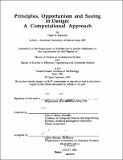Principles, opportunism and seeing in design : a computational approach
Author(s)
Papazian, Pegor H. (Pegor Hratch)
DownloadFull printable version (9.045Mb)
Other Contributors
Massachusetts Institute of Technology. Dept. of Electrical Engineering and Computer Science.
Advisor
Patrick Henry Winston.
Terms of use
Metadata
Show full item recordAbstract
This thesis introduces elements of a theory of design activity and a computational framework for developing design systems. The theory stresses the opportunistic nature of designing and the complementary roles of focus and distraction, the interdependence of evaluation and generation, the multiplicity of ways of seeing over the history of a design session versus the exclusivity of a given way of seeing over an arbitrarily short period, and the incommensurability of criteria used to evaluate a design. The thesis argues for a principle based rather than rule based approach to designing design systems, and highlights the manifest nature of design documents. The Discursive Generator is presented as a computational framework for implementing specific design systems, and a simple system for arranging blocks according to a set of formal principles is developed by way of illustration. Both shape grammars and constraint based systems are used to contrast current trends in design automation with the discursive approach advocated in the thesis. The Discursive Generator is shown to have some important properties lacking in other types of system, such as dynamism, robustness and the ability to deal with partial designs. When studied in terms of a search metaphor, the Discursive Generator is shown to exhibit behavior which is radically different from some traditional search techniques, and to avoid some of the well-known difficulties associated with them.
Description
Thesis (M.S.)--Massachusetts Institute of Technology, Dept. of Architecture; and, (M.S.)--Massachusetts Institute of Technology, Dept. of Electrical Engineering and Computer Science, 1991. Includes bibliographical references (leaves 100-103).
Date issued
1991Department
Massachusetts Institute of Technology. Department of Architecture; Massachusetts Institute of Technology. Department of Electrical Engineering and Computer SciencePublisher
Massachusetts Institute of Technology
Keywords
Architecture., Electrical Engineering and Computer Science.